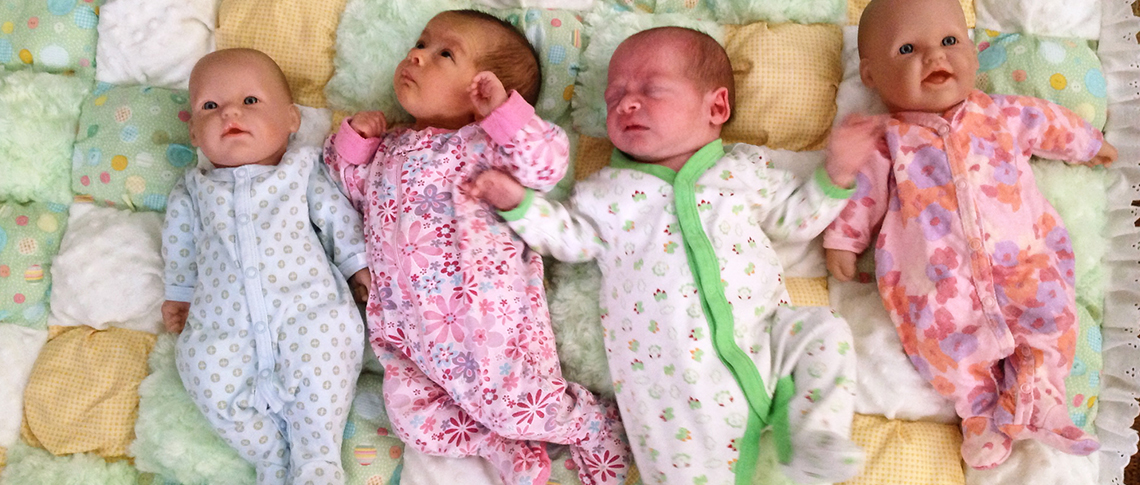
November 19, 2015

At five weeks old, Briana and Julien Houle pose with older sister Rowen’s dollies.
Story and Photo by Sara Warr
Keli Houle knew that having two babies at once was going to be difficult. Already a mother to two-year-old Rowen, Houle wasn’t expecting her twins for another five weeks. But the twins had other plans.
“It all happened so quickly,” Houle recalls, “Briana was anxious to come out, so I had her naturally. But Julien was reluctant. He was transverse and didn’t want to come out so he was delivered via c-section. It was scary how small they were.”
Houle and her husband Marc quickly realized that parenting two premature babies was going to be even harder than they imagined.
“You have no idea what kinds of challenges and decisions you’re going to be forced to make, until you’re in the middle of it,” she explains.
“It’s a different way of raising your baby – especially in the very beginning,” says Katharina Staub, President of the Canadian Premature Babies Foundation.
There are a wide range of health issues and complications that premature babies can face, depending on their gestational age and other factors. The Canadian Premature Babies Foundation aims to raise awareness of these challenges and offer support to families dealing with the emotional impact of having a pre-term baby.
“It’s difficult to bond with a baby who’s born really early and tiny because you’re not sure if your baby’s going to survive – so you’re afraid to even feel anything in the beginning,” explains Staub, who was also a mother to premature twins.
“Sharing and talking about those feelings and experiences, including guilt – is very important to making sure that families do thrive and have a good start when they get home,” she adds.
From the start, the Houle twins were admitted to the neo-natal intensive care unit (NICU) at the Queen Elizabeth II (QEII) Hospital in Grande Prairie, which saw a total of 2034 births in 2014.
“This included 180 premature babies who were admitted with complications of prematurity,” says Dianne Sweetman, the NICU and pediatrics unit manager at the QEII Hospital. Every November the site celebrates their NICU graduates with a tea to mark World Prematurity Day. The event is organized by staff volunteers and is supported by the QEII Hospital Foundation.
“One in eight babies in Alberta are born premature,” adds Sweetman. “We think it’s important to recognize the struggles that these families and babies have been through and celebrate their successes.”
Houle says she’ll always be grateful for the guidance she received from the staff and physicians during a very emotionally charged time.
“We’re very lucky to have smart well-educated nurses to help us make those difficult decisions, and knowing that you have their support in making those decisions, is amazing,” she says. “There are no right or wrong decisions, it’s what’s best for the babies at the time.”
For more information on the Canadian Premature Babies Foundation, visit cpbf-fbpc.org.